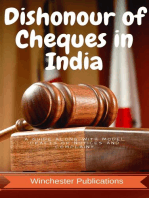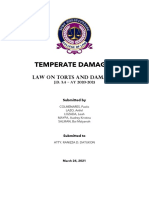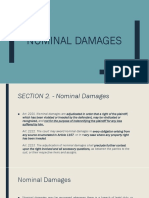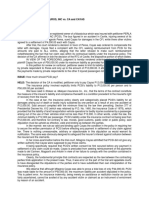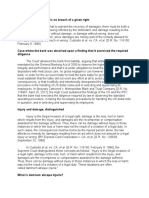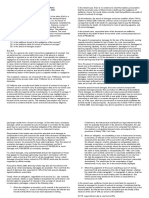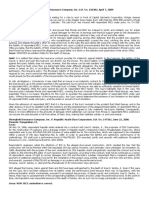Chapter Sixteen Damages 1. Definition and Concept
Chapter Sixteen Damages 1. Definition and Concept
Uploaded by
Deeej cartalCopyright:
Chapter Sixteen Damages 1. Definition and Concept
Chapter Sixteen Damages 1. Definition and Concept
Uploaded by
Deeej cartalOriginal Title
Copyright
Share this document
Did you find this document useful?
Is this content inappropriate?
Copyright:
Chapter Sixteen Damages 1. Definition and Concept
Chapter Sixteen Damages 1. Definition and Concept
Uploaded by
Deeej cartalCopyright:
CHAPTER SIXTEEN
DAMAGES
1. DEFINITION AND CONCEPT.
In the case of People vs. Ballesteros, the Supreme Court defined the word “damage” as
the pecuniary compensation, recompense, or satisfaction for an injury sustained, or as
otherwise expressed, the pecuniary consequences which the law imposes for the breach of
some duty or violation of some rights.
In the case of Garrido vs. De la Paz, the Supreme Court explained that in order to
recover damages, the claimant must prove the following: 1) injury or wrong sustained; 2) as
consequence of a breach of contract or tort; and 3) caused by the party chargeable with a
wrong. Damages may be claimed not only if the source of obligation is contract or quasi-delict
but also if the source of obligation is law, delict, and quasi-contract.
Complaint is a personal action. Cited in the case of Baritua vs. CA, it may be commenced
and tried where the defendant or any of the defendant resides or may be found, where the
plaintiff or any of the plaintiffs resides at the election of the plaintiffs.
Discussed in the case of Heirs of Simeon Borlado vs. CA, award must be monetary, courts
should award an amount to the winning party and not its equivalent in property.
2. DAMNUM ABSQUE INJURIA.
As cited in the case of Custudio vs. CA, there is not liability even if there is damage
because there is not injury. Mere damage without injury does not result in liability.
It was also invoked in the case of Equitable Banking Corporation vs. Calderon, it is a case
involving cancellation of credit card pursuant to the provisions of the credit card agreement
allowing automatic suspension of the credit card if the holder exceeded the limit provided for
the card. There is no injury even if the cardholder suffered because of the dishonor of the card
by a merchant.
You might also like
- Dishonour of Cheques in India: A Guide along with Model Drafts of Notices and ComplaintFrom EverandDishonour of Cheques in India: A Guide along with Model Drafts of Notices and ComplaintRating: 4 out of 5 stars4/5 (1)
- Final Requirement in Constitutional Law 1 Atty. Malig OnDocument504 pagesFinal Requirement in Constitutional Law 1 Atty. Malig OnDeeej cartalNo ratings yet
- Chapter Sixteen Damages 1. Definition and ConceptDocument2 pagesChapter Sixteen Damages 1. Definition and ConceptDeeej cartalNo ratings yet
- 4.01. Kinds or Components of Actual DamagesDocument6 pages4.01. Kinds or Components of Actual DamagesDeeej cartalNo ratings yet
- Torts ReviewerDocument25 pagesTorts ReviewerJoven CamusNo ratings yet
- Actual Damages OutlineDocument12 pagesActual Damages OutlineRussel Sirot100% (1)
- Breach of Contract RemediesDocument6 pagesBreach of Contract RemediesAbdul Salam khuhro100% (3)
- Perla Compania vs. CADocument3 pagesPerla Compania vs. CAJm Eje100% (1)
- Jamia Millia Islamia: Assignment On Contract LAWDocument17 pagesJamia Millia Islamia: Assignment On Contract LAWSushant NainNo ratings yet
- Arco Pulp vs. LimDocument12 pagesArco Pulp vs. LimLou StellarNo ratings yet
- Damages Under Contract ActDocument27 pagesDamages Under Contract ActSHRUTINo ratings yet
- Petitioner vs. vs. Respondents: en BancDocument7 pagesPetitioner vs. vs. Respondents: en BancaksaNo ratings yet
- 126893-1995-Far East Bank and Trust Co. v. Court Of20231227-12-Umv80fDocument8 pages126893-1995-Far East Bank and Trust Co. v. Court Of20231227-12-Umv80fkaloy915No ratings yet
- TumolvaDocument2 pagesTumolvaSealtiel VillarealNo ratings yet
- Far East Vs CADocument3 pagesFar East Vs CADyords TiglaoNo ratings yet
- Notes - DamagesDocument7 pagesNotes - DamagesRichard CoatesNo ratings yet
- Institution: University of Embu Department:Law Programme: Law Title:Cat 2 Contracts Name:Sayo Stephannie Esther REG - NO:L250/19012/2020Document4 pagesInstitution: University of Embu Department:Law Programme: Law Title:Cat 2 Contracts Name:Sayo Stephannie Esther REG - NO:L250/19012/2020Stephannie EstherNo ratings yet
- Torts&Damages TemperateDamages ReportDocument11 pagesTorts&Damages TemperateDamages ReportAudrey Kristina MaypaNo ratings yet
- Contract - Damages in Law and TortDocument11 pagesContract - Damages in Law and TortSana KhanNo ratings yet
- Insurance Case DigestsDocument47 pagesInsurance Case DigestsJohn Soap Reznov MacTavish100% (1)
- Damages in TortsDocument15 pagesDamages in TortsLanyut MonicaNo ratings yet
- Torts Final MeetingDocument5 pagesTorts Final MeetingAntonio SantosNo ratings yet
- Western Guaranty Vs CADocument3 pagesWestern Guaranty Vs CATeacherEliNo ratings yet
- 19 Casino JR V CaDocument11 pages19 Casino JR V CaPeachChioNo ratings yet
- Damages JurisfoDocument5 pagesDamages JurisfoDoggo OggodNo ratings yet
- Remedies AssignmentDocument1 pageRemedies AssignmentGeorge IsabellaNo ratings yet
- Damages HandoutsDocument22 pagesDamages HandoutsYen055No ratings yet
- Victory Liner, Inc. vs. GammadDocument2 pagesVictory Liner, Inc. vs. GammadJakeDanduan50% (2)
- GR 156168Document2 pagesGR 156168EJ SantosNo ratings yet
- Nominal DamagesDocument14 pagesNominal DamagesMark De JesusNo ratings yet
- Contract of Indemnity and InsuranceDocument6 pagesContract of Indemnity and InsuranceShankha Shubhra ChakrabartyNo ratings yet
- Republic Planters Bank v. Court of AppealsDocument9 pagesRepublic Planters Bank v. Court of AppealsAmmie AsturiasNo ratings yet
- Arco Pulp and Paper Co. Inc. and Santos v. LimDocument27 pagesArco Pulp and Paper Co. Inc. and Santos v. LimVal Escobar MagumunNo ratings yet
- CD - 12 Perla Compania v. CA and CayasDocument1 pageCD - 12 Perla Compania v. CA and CayasAlyssa Alee Angeles JacintoNo ratings yet
- Topic 1: Introduction To Torts and ContractDocument4 pagesTopic 1: Introduction To Torts and ContractEugenia JinNo ratings yet
- 1588869688contractDocument11 pages1588869688contractokohfavour70No ratings yet
- 14 - Western Guaranty, Corp. v. Court of Appeals - GMSGDocument2 pages14 - Western Guaranty, Corp. v. Court of Appeals - GMSGGeorge Mitchell S. GuerreroNo ratings yet
- Basic Rules and Principles On Quasi-DelictDocument4 pagesBasic Rules and Principles On Quasi-DelictMay Lann LamisNo ratings yet
- Summary of ProceedingsDocument2 pagesSummary of ProceedingsAkash RayNo ratings yet
- No Liability Where There Is No Breach of A Given RightDocument11 pagesNo Liability Where There Is No Breach of A Given RightNj BarandiaNo ratings yet
- 8Document80 pages8Hannah Khamil MirandaNo ratings yet
- 123709-1999-Cebu International Finance Corp. v. Court ofDocument10 pages123709-1999-Cebu International Finance Corp. v. Court ofKrizel BianoNo ratings yet
- Victory Liner Inc Vs GammadDocument2 pagesVictory Liner Inc Vs GammadRose De JesusNo ratings yet
- Exemplary, When ProperDocument5 pagesExemplary, When ProperRyan AcostaNo ratings yet
- GROUP1Document103 pagesGROUP1Meku DigeNo ratings yet
- Arco Pulp vs. Paper Co., Inc vs. Lim 727 SCRA 275Document14 pagesArco Pulp vs. Paper Co., Inc vs. Lim 727 SCRA 275Therese ElleNo ratings yet
- Vda. de Maglana v. Consolacion, Vda. de MaglanaDocument6 pagesVda. de Maglana v. Consolacion, Vda. de MaglanaganubNo ratings yet
- Remoteness of DamagesDocument2 pagesRemoteness of DamagesSiddarth BelliappaNo ratings yet
- 50 - Arco Pulp and Paper Co. v. LimDocument27 pages50 - Arco Pulp and Paper Co. v. LimChristopher Martin GunsatNo ratings yet
- Law of Tort BDocument20 pagesLaw of Tort BSamuel LahatNo ratings yet
- Social - Security - System - v. - Court - of - Appeals20230818-24-Cji0ujDocument20 pagesSocial - Security - System - v. - Court - of - Appeals20230818-24-Cji0ujJofian Ella Rectra PartisalaNo ratings yet
- Res Cis S Ion DamagesDocument12 pagesRes Cis S Ion DamagesPrateek KhandelwalNo ratings yet
- IndemnityDocument5 pagesIndemnitynirmalmandal7074No ratings yet
- Life, Accident and Health Insurance in the United StatesFrom EverandLife, Accident and Health Insurance in the United StatesRating: 5 out of 5 stars5/5 (1)
- Demolition Agenda: How Trump Tried to Dismantle American Government, and What Biden Needs to Do to Save ItFrom EverandDemolition Agenda: How Trump Tried to Dismantle American Government, and What Biden Needs to Do to Save ItNo ratings yet
- Legal Concepts for Insurance Agent Ethics: How Agents Get Sued and Lose Their LicensesFrom EverandLegal Concepts for Insurance Agent Ethics: How Agents Get Sued and Lose Their LicensesNo ratings yet
- Structured Settlements: A Guide For Prospective SellersFrom EverandStructured Settlements: A Guide For Prospective SellersNo ratings yet
- The Economic Policies of Alexander Hamilton: Works & Speeches of the Founder of American Financial SystemFrom EverandThe Economic Policies of Alexander Hamilton: Works & Speeches of the Founder of American Financial SystemNo ratings yet
- Case Digest SynthesisDocument12 pagesCase Digest SynthesisDeeej cartalNo ratings yet
- SPL DigestsDocument29 pagesSPL DigestsDeeej cartalNo ratings yet
- Easements or Servitudes: (Arts. 627-636)Document38 pagesEasements or Servitudes: (Arts. 627-636)Deeej cartalNo ratings yet
- Is International Law-Law?Document15 pagesIs International Law-Law?Deeej cartalNo ratings yet
- PIL AssignmentDocument3 pagesPIL AssignmentDeeej cartalNo ratings yet
- Consti Revalida Assignment PacañaDocument13 pagesConsti Revalida Assignment PacañaDeeej cartalNo ratings yet
- Sales DigestsDocument17 pagesSales DigestsDeeej cartal100% (1)
- Distinction Between Writ of Kalikasan and Continuing Mandamus Kalikasan Continuing MandamusDocument3 pagesDistinction Between Writ of Kalikasan and Continuing Mandamus Kalikasan Continuing MandamusDeeej cartalNo ratings yet
- Subject: Constitutional Law 1 Topic: The Doctrine of State of Immunity Title: Ruiz v. Cabahug Citation: 54 O.G. 351Document1 pageSubject: Constitutional Law 1 Topic: The Doctrine of State of Immunity Title: Ruiz v. Cabahug Citation: 54 O.G. 351Deeej cartalNo ratings yet
- Title: Tobias vs. Abalos Citation: 239 SCRA 106Document3 pagesTitle: Tobias vs. Abalos Citation: 239 SCRA 106Deeej cartalNo ratings yet
- 4D3N Magnificent BatanesDocument3 pages4D3N Magnificent BatanesDeeej cartalNo ratings yet
